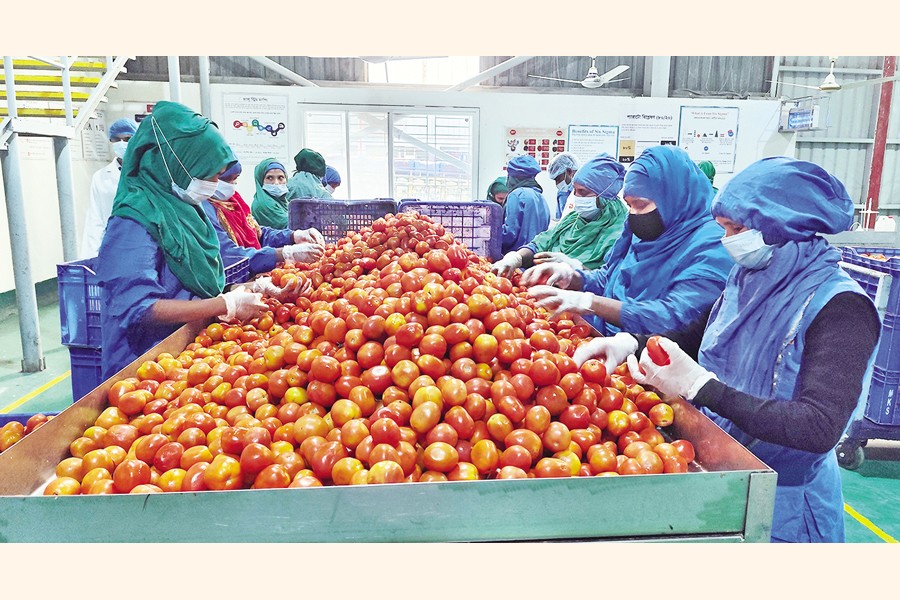Rising taxes add to tomato growers’ woes
Contract farmers face hefty losses after tomato harvest
Experts suggest additional VAT withdrawal

Published :
Updated :

Standing on his sprawling 75-bigha (approximately 19 hectares) tomato farmland in Godagari, Rajshahi, Md Ifetkhar Ahmed, a nationally awarded farmer (2007), speaks on a frustrating note.
While his initial harvests fetched a decent price, more than 60 per cent of his tomatoes still remain in fields unsold.
Mr Ahmed cultivated the crop under the supervision of leading agro-processing company - PRAN -- under an agreement to sell the remainder to the company at a market rate after initial harvests.
However, the company has reneged on its commitment, citing rising production costs due to a recent VAT hike on tomato-based products like ketchup and sauce.
"The company earlier assured me of buying all tomatoes, but they stopped purchasing since last Tuesday," lamented the grower.
Mr Ahmed, along with his three friends, invested over Tk 3.0 million in tomato cultivation this season, but has so far recouped only Tk 2.0 million, leaving at least Tk 1.0 million in loss, let alone a profit.
The farmers are likely to incur a hefty loss if the company does not purchase the vegetable with a lot of juice and shiny red skin.
"We have to leave the tomatoes in the field as the market price is lower than the labour cost needed to pluck them from plants," Mr Ahmed told the FE.
His predicament reflects the struggle of more than 10,500 contract farmers in the country's northern region, now grappling with uncertainty.
The crisis stems from a recent decision by the National Board of Revenue. On January 09, the tax watchdog raised VAT and supplementary duty significantly.
The VAT on items like pickles, biscuits, cakes, chutneys, tomato paste, ketchup, and sauce was increased to 15 per cent from 5.0 per cent.
This policy shift has directly impacted companies like PRAN, a major agro-processor sourcing tomato, mango, peanut and milk from contract farmers across Rajshahi, Bagerhat, Khulna and Thakurgaon.
Many farmers are part of PRAN's "PRAN Assured Scheme," which deliver training and support to more than 5,000 selected farmers in collaboration with the International Finance Corporation.
"This year, we signed contracts with farmers to cultivate tomatoes on 2,800 bighas, targeting the collection of 22,000 tonnes," said Kamruzzaman Kamal, marketing director of PRAN-RFL Group.
"The sudden VAT hike has forced us to revise our production planning."
PRAN is the market leader in tomato sauce, holding the largest share of the Tk 6.0-billion domestic market.
The company also supplies tomato paste, which converts tomato sauce or ketchup after adding other ingredients, to smaller local sauce manufacturers that lack processing facilities.
"This hike in VAT is a blow to us as we had planned to boost our capacity further this year," said AKM Moinul Islam Moin, deputy managing director of PRAN Group, during a visit to the Godagari sauce plant.
The Godagari plant, a six-sigma-compliant facility, has the capacity to produce more than 50 tonnes of sauce per day, requiring over 400 tonnes of raw tomatoes.
"The sudden VAT hike has disrupted the entire supply chain and will affect the entire agricultural processing industry," added Mr Moin.
There are several other agro-processing producers, including Shezan, Kishwan and Square. The VAT hike has not only strained farmers' livelihood, but also raised concerns about the sustainability of agricultural processing in Bangladesh.
Ms Morium, an agricultural extension official at Godagari, told the FE that tomato seeds were hybrid and production was higher in the sub-district.
If farmers do not get fair prices, they will be discouraged to do the cultivation next year, according to her.
Agro-economists say major agro-processors are likely to import tomato pulp from neighbouring countries to keep prices affordable amid persistently high inflation on the economy.
They urged the tax authorities to avoid imposing higher taxes on agro-processors, arguing that these industries serve as import substitutes and create significant local employment opportunities.
"There are many new players in the agro-processing industry in recent years, and they should be treated as infant industries," said Jahangir Alam of Bangladesh Agricultural University.
"Government policy aims to mechanise and commercialise agriculture, but such taxes contradict this spirit," said the agricultural economics professor.
Prof Golam Hafeez Kennedy of the same agri varsity told the FE that discouraging farmers from harvesting would ultimately frustrate food security.
He suggested that the government withdraw the additional 10 percentage point VAT on tomato and other allied agri items.
jasimharoon@yahoo.com


 For all latest news, follow The Financial Express Google News channel.
For all latest news, follow The Financial Express Google News channel.